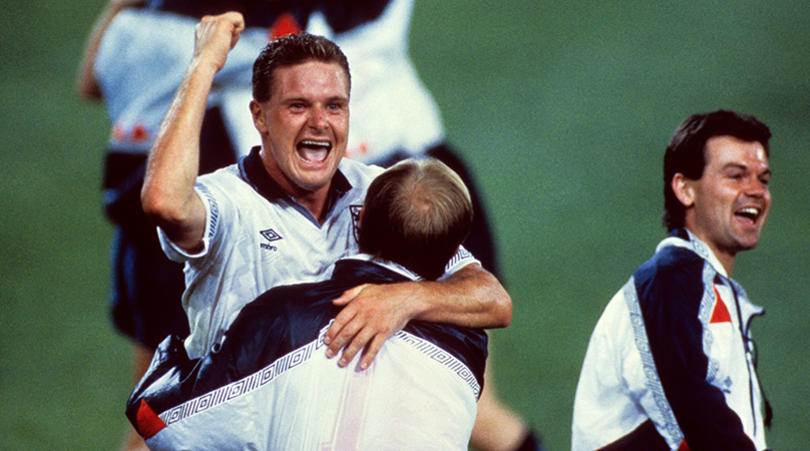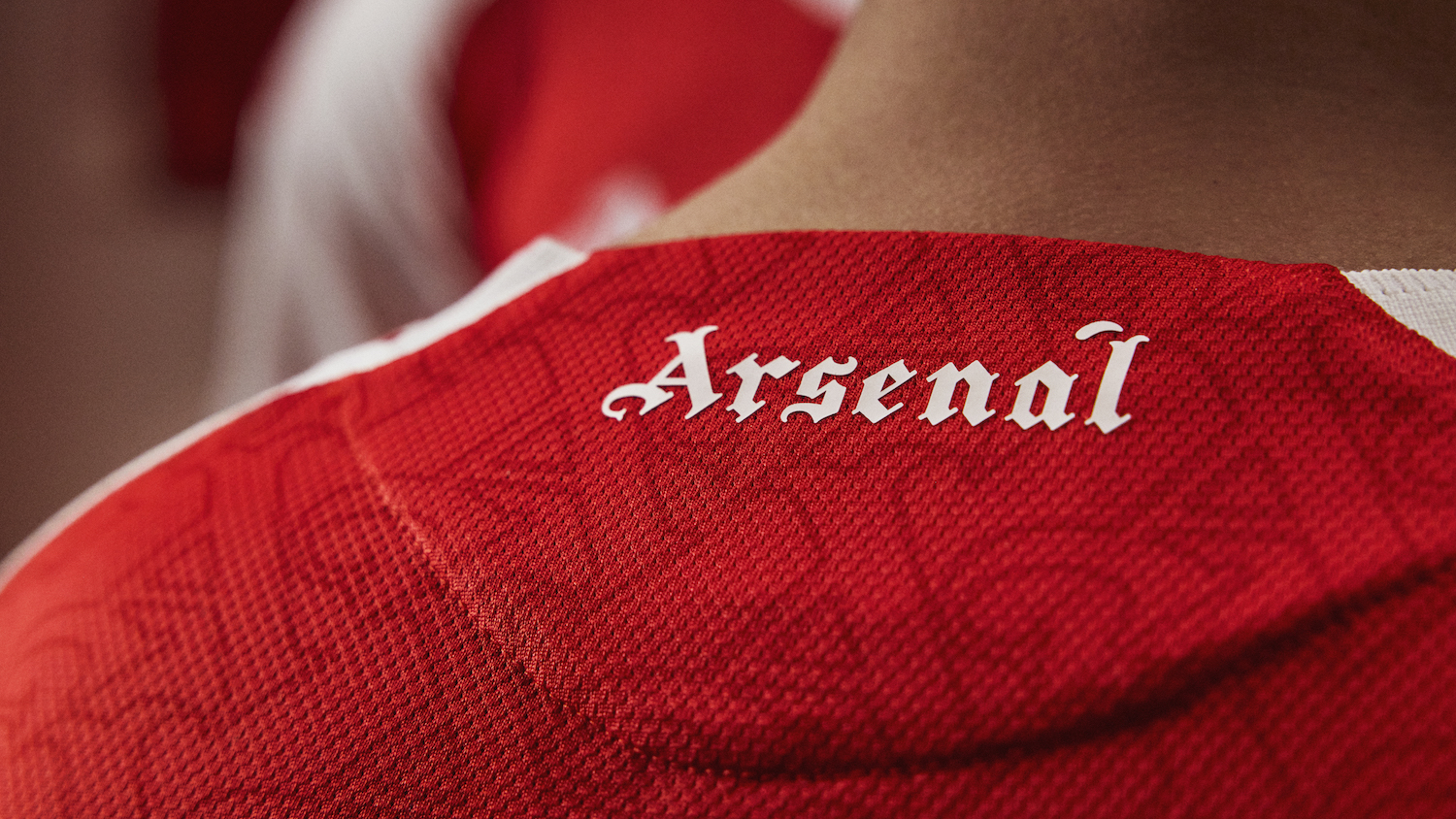It’s coming home: why Three Lions is such an important song in English football culture
Why did Three Lions catch on to the point that - 22 years after its release - it's once again become the soundtrack to an English summer? Gary Parkinson explains the popularity and perfection of an anthem

Like so many pop songs, Three Lions is about love and loss, but it’s also about cultural identity, about longing and belonging, about people and place, about nationhood and about the irretrievability of the past and the possibilities of the future.
It keys into a very English trait of gently expecting disappointment: “Hanging on in quiet desperation is the English way,” as Pink Floyd put it on Dark Side of the Moon. It’s not so much outright negativity as slight bewilderment that things have gone so far downhill from a previous position atop the global pile.
Indeed, you could replace much of the football content with similarly structured sentiments about a post-industrial malaise, the late-20th-century loss of historical national pride and achievement stretching back through world wars and Victorian era to Waterloo, the industrial revolution and on back into history’s mists. But of course, it’s about football.
Ecstasy to agony
English football ended the 1990s in much better shape than it started them, but it didn’t follow a smooth upward parabola. The Ecstasy-fuelled optimism that surrounded Italia 90 had dissipated with the violent comedown of a hopeless Euro 92 – three games, no wins, one goal, legendary striker (a certain Gary Lineker) substituted when chasing a goal, out in the groups – which somehow managed to seem like a triumph when followed by the failure to qualify for USA 94.
Graham Taylor was turfed out and at least England got a free ticket to Euro 96 by hosting it, but they hardly roared in as hotly-backed favourites. Although post-facto soundbite simplification may render England’s 1996 an annus mirabilis, the build-up was mainly negative: failure was anticipated.
Restricted to friendlies, Terry Venables’ team were held by Romania, Sweden, Colombia, Norway, Portugal and Croatia. At least they finished those fixtures, unlike the one in Dublin abandoned when ferry-hopping hoolies rioted at Lansdowne Road.
The best features, fun and footballing quizzes, straight to your inbox every week.
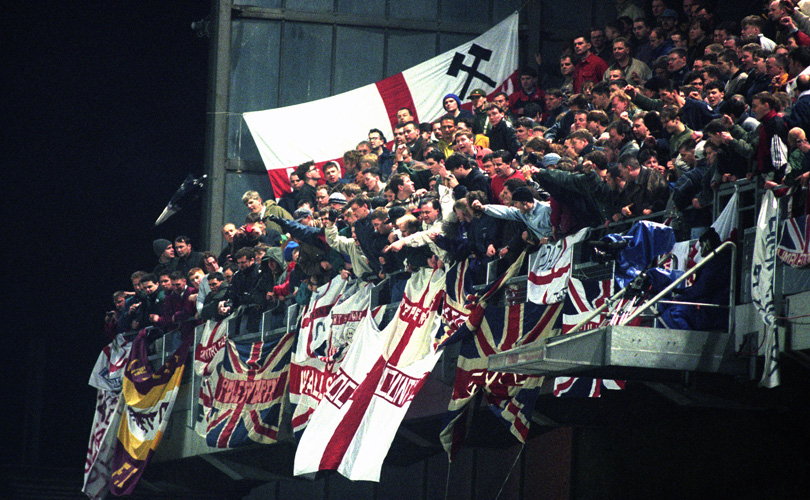
The tabloids turned on the team: the front pages pruriently revelled in a drunken dabble with the dentist’s chair, while the back pages wondered why Venables – whom they’d managed to hound out in advance of the tournament by spooking the FA over his business activities – insisted on picking Alan Shearer when he hadn’t scored in 13 caps over 21 months. The mood music around England was neither hope nor glory: many thought the team might stink the place out while the fans rioted.
So it was against a negative backdrop that the FA commissioned the England song from a pair of comedians and a Britpop backgrounder. It wasn’t as mad an idea as it sounds: Chelsea fan David Baddiel and West Brom loyalist Frank Skinner had been hosting Fantasy Football League for two years. Meanwhile, Lightning Seeds main-man Ian Broudie was a wonderful songwriter already embedded in football: an instrumental version of his 1992 single The Life of Riley (written for and about his son) had long been used under goal compilations on Match of the Day.
While never exactly a household name, Broudie had already clocked up seven top-40 hits and certainly knows his way around a pop song. Spying his chance to write an anthem, he gave Three Lions the full treatment.
The music is simple yet clever. Like many of pop’s greatest hits from Dancing Queen to I Should Be So Lucky, it starts with a disguised foreshadowing of the chorus; in this case, it’s a simplification to a rotation between its two main chords of A-flat major and E-flat major.
Here’s where it starts to get subtly smart. The song is in E-flat major but the intro and the chorus both start in A-flat major; this leads the ear on an eternal journey around the cyclical chord pattern, searching for the comfort of the home key. In both cases, it finds it but doesn’t settle and moves on again, giving a glimpse of closure and completion before moving ever onwards. Try singing the chorus and ending it without a fade, in the manner of a live gig, anywhere in the chorus: it can’t be done satisfactorily, because it’s always pulling you on.
E-flat major is, at heart, a happy chord and a happy key. The home key of several important brass instruments, it has long been used for bold, optimistic music. Beethoven loved it, Mozart used it for three horn concertos, Richard Strauss chose it for A Hero’s Life, Holst selected it for the heroic theme for Jupiter in The Planets. You get the picture.
Lightning in a bottle
While Broudie may not have intended to invoke classical composers, he’s a savvy enough fan of Sixties music to include a couple of subtle references to those halcyon days which somewhat coincided with England’s World Cup triumph (see Jon Savage’s 1966 for a brilliant analysis of that year’s music and culture).
After the traditional crowd-noise sample, here cleverly cut to a 4/4 rhythm which foreshadows the beat, the instrumentation starts with the four-to-the-bar staccato keyboard chords forever redolent of Paul McCartney in 1967: Penny Lane, Fixing a Hole, Getting Better, With a Little Help From My Friends.
As the intro continues, subtly in the background a horn plays a five-note fanfare which, by rising then falling off slightly, manages to sound simultaneously hopeful and mournful. If it sounds familiar as well as forlorn, it’s because it’s a kissing cousin of the French horn which kicks off the Beach Boys’ God Only Knows, a similarly deathless combination of hope and fear.
On a more parochial note, the intro is overladen with samples of despairing post-match criticism from Alan Hansen, Trevor Brooking and Jimmy Hill, who as the voices of the BBC represented a state-sanctioned panel of head-shaking experts.
Their pessimism is undercut by the entrance of the refrain “it’s coming home”. Placed front and centre, it was obviously designed to become the hook, singable in any state of inebriation; 22 years later, it's become a meme so ubiquitous that in some cases it untethered from the original tune.
In fact, and with typical facility of melody, Broudie somewhat accidentally wrote two choruses: “it’s coming home” and “Three Lions on a shirt…”. By luck and judgement he was able to use both, one as the intro refrain and one as the chorus.
If that initial refrain sounds like a brand message, it was: ‘Football Comes Home’ was the official Euro 96 tagline, with UEFA chief Lennart Johansson welcoming the trip “back to the motherland of football”. The Prime Minister Tony Blair, always happy to hitch a ride on football’s popularity at the behest of his Burnley-supporting spin wizard Alistair Campbell, lifted the Three Lions refrain at his party’s late-summer conference: “17 years of hurt never stopped us dreaming: Labour’s coming home”. By the following summer they were indeed back in power.
Here it’s not being suggested by suits proffering PowerPoint presentations, but subtly changed to the present continuous tense, repeated in a state of almost childlike wonderment: “It’s coming home, it’s coming home, it’s coming… football’s coming home.”
Fittingly, it’s on the first syllable of ‘football’ that the music lands on the home-key chord of E-flat major. The simple refrain introduces the idea of home, of longing and belonging, of excitement and anticipation, of all being right in the world.
Major lift-off
After establishing the musical mood and lyrical concept by cycling through A-flat major and E-flat major and repeating the refrain, the song brings in the rhythm section as it goes into the chorus chords proper – albeit not yet with the “Three Lions” lyrics, which are saved for a climactic reveal after the first verse.
The chorus chords descend from A-flat major through a passing G note to F minor (as heard in the chorus proper under the lyrics “Three Lions on a shirt…”), then quickly resolving via B-flat major to the home chord of E-flat major – from which it immediately starts to descend back to A-flat major (“...Jules Rimet still gleaming”). After going through what Leonard Cohen’s Hallelujah called “the minor fall and major lift”, the sanctuary of the home key is only fleeting: the song marches ever onwards via its cyclical chord progression.
Having excitedly crashed in to announce the intro’s transition from winsome to forceful, the drums settle into a fairly straightforward rock/pop pattern for the chorus – snare on every beat of the 4/4, ride cymbal all the way through, crash cymbal at the start of the first and third bar in every four-bar section – with a small exception: between the second and third beat there’s an extra snare hit, giving the rhythm something between a stumble and a skip, befitting the fan’s bipolarity of alternating hope and despair in a constant cycle of expectation and disappointment. Tuneful but thoughtful and evocative, Three Lions constantly drags you down and up – just like your favourite football team.
For the verse, dynamics demand that the arrangement clears a little, so the drums drop to a regular hi-hat with the snare reduced to the second and fourth beat. More notably, the chords drop the descending note-line performed in unison by the forceful ensemble of bass, guitar and low keyboards on every foursquare beat of the intro/chorus. In the verses, the guitars sound simple but there are at least three parts doing subtly different things – typical of Broudie: see his superb arrangement of fellow Scousers The Coral’s breakthrough hit Dreaming of You.
Skinner sings the blues
You may not be listening to the guitars in the verses, because you’re listening to that bloke off the telly singing about football. Frank Skinner is an old-school music buff – a lover of Elvis Presley and George Formby, a player of the banjo ukelele – and his perhaps surprisingly soft singing voice suits the wistful lyric he’s about to set out, largely written in conjunction with Baddiel but with input from Broudie and FA conduit Rick Blaskey, who urged the comedians to stay on the bittersweet side of cynical.
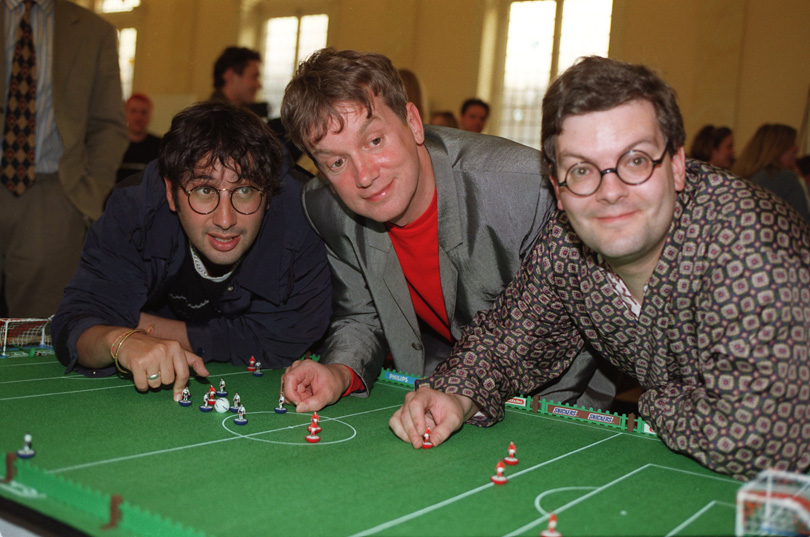
Broudie, Baddiel and Skinner wanted to write lyrics rejected triumphalism for emotions more in tune with the everyday supporter. “I thought it was only worth making if it reflected how it feels to be a football fan,” Broudie has said. “Even the most successful teams don’t always win, but there’s a suspension of reality and you believe anyway.”
Or, according to the opening lyrics, you don’t. “Everyone seems to know the score...”. Beside the obvious pun on ‘score’, this immediately introduces doubt: if everyone ‘seems’ to know, the narrator is quite possibly an outsider disagreeing with the received wisdom.
“They’ve seen it all before” introduces a world-weariness at the apparently inevitable repetition of failure, but the definitive shift to the third person plural delineates the difference between the narrator and the pack mentality, underlined by the derisive third line: “They just know, they’s so sure.”
What the not-so-silent majority are sure about is that things are going to go wrong: “England’s gonna throw it away, gonna blow it away”. We’ve all sat next to that bloke who revels in predicting doom – every corner conceded heralds an imminent goal to the opposition, every move broken down proof that the players and manager are hopeless. It makes it doubly annoying when he’s proven right, as he will be on occasion, and trumpets his I-told-you-so as a badge of honour.
The Three Lions lyrics defiantly kick against this endless negativity, often media-driven because scapegoating sells better than sympathy. At this point in the video, having turned off the TV Skinner grabs Baddiel’s tabloid newspaper and tosses it away, rejecting the spoonfed viewpoint and defiantly asserting, in the first-person singular: “But I know they can play, ‘cause I remember…”
A crescendo
While the lyrics attract your ear, the chords play some very clever games with your brain. The verse starts on the muted tones of F minor (“Everyone…”) before switching, as in the chorus, through B-flat major (“seems to know the…”) – but then, unexpectedly and beautifully, lands on E-flat seventh (“score…”). This is almost the home key but not quite: the dominant seventh (in E-flat major, a D-flat) adds a plangent sadness – it’s a sound fundamental to the structure of blues music, for example. There’s a sense of near-completion, but with a tragic fragile edge provided by the ‘blue note’ outside the diatonic scale. You can hear the sad-sounding note under the lyrics “score”, “sure” and “know (they can play)”.
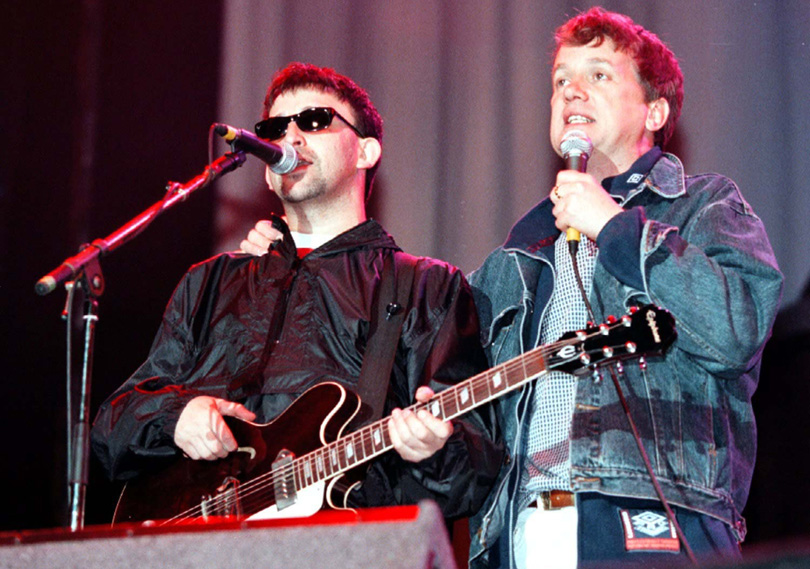
Whether or not your conscious brain recognises it, that chord raises a musical question further complicated by the next chord. For “(they’ve) seen it all before…”, the music shifts from E-flat seventh to C major, thus diminishing further that blue dominant seventh of D-flat to C – while simultaneously raising the home chord’s E-flat to E natural. The music is pulling your emotions in two directions at once, falling and rising, hope and despair.
And so to the chorus. The Three Lions are a curious symbol for a notably temperate country whose only leonine inhabitants are to be found in zoos – but then, these things aren’t always obvious: there’s no orange on the Dutch flag or blue on the Italian tricolour.
The FA has used the triple-lion image since its 1863 formation, but it goes back much further as a heraldic reaction to the 1154 marriage of Henry II to Eleanor of Aquitaine; their son Richard the Lionheart took the badge into battle and it has been ‘English’ ever since. None of which matters to football fans, for whom the Three Lions are just the badge over the hearts of the players lucky enough to represent their country.
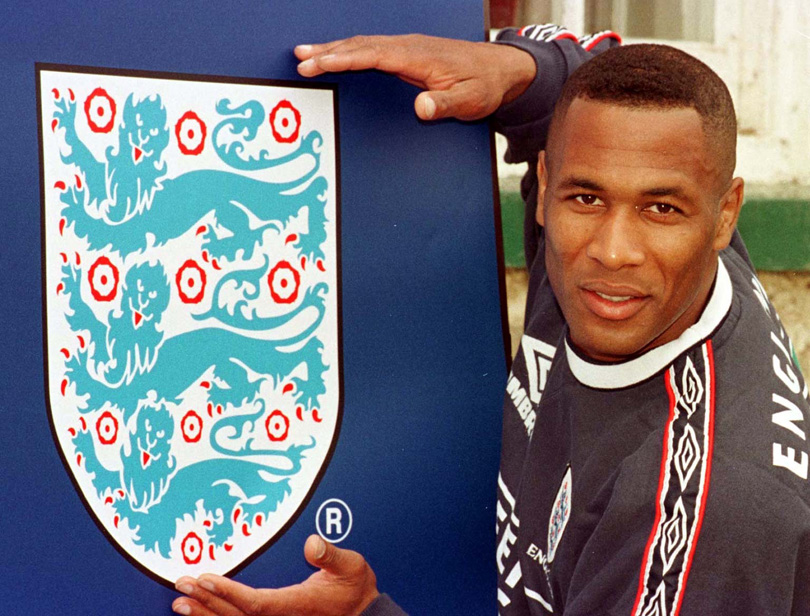
But looking back is a strong temptation. With “Jules Rimet still gleaming”, the lyrics mention a trophy that hasn’t been in circulation since The Beatles were still a going concern. By now we’re definitely in history class: “Thirty years of hurt” – later extended to more than 50 – “never stopped me dreaming”. This is a brave acknowledgement that your footballing hopes may not be realistic but it’s still a dream, and what is life worth without dreams?
Enter Baddiel
By his own admission, David Baddiel is nobody’s idea of a singer: he was only too happy for the mustard-keen Skinner to take the bright spotlight of the first verse. By the time Baddiel shuffles up for his solo lines, the song is well-established enough for a less natural singer to take the microphone – and act which in itself inclusively emboldens the less tuneful listeners to join in.
Again, the arrangement works perfectly: while Skinner’s softer voice suits the wistful opening lines, Baddiel’s brasher pipes tackle the rawer subjects of the second verse. Having already set up the narrative voice against the orthodoxy, the lyrics reveal its hurtful nature.
With “so many jokes, so many sneers”, the perceived wisdom is now more than fatalism, it’s victimising the England team and the dreamers who follow it. It’s hard enough being a football fan when “All those oh-so-nears wear you down through the years”; instead of reflexive hatred, this is historical failure remembered sympathetically and in community.
Again the verse hinges on a coordinating conjunction – “But I still see...” – except this time it’s much earlier, halfway through, because the lyric is casting off the shackles of negativity and revelling in happy memories, sung in unison by Baddiel and Skinner. These aren’t necessarily the huge triumphs, and they’re not confrontational – it doesn’t say “beating the Germans” or “taking on the world”.
Indeed, unusually for football it doesn’t employ any of the military metaphors so embedded in the lexicon that they’re normalised into invisibility: attack, defence, aerial bombardment, key battlegrounds, entrenched, enemy territory, midfield general, war of attrition, under fire, close range, and on and on. Skinner said in his autobiography that the original lyric’s second-verse litany included “Butcher ready for war”, referencing centre-back Terry’s iconic bloodied shirt in a 1989 qualifier; the FA vetoed this on anti-hooliganism grounds, in its own quiet way as correct a call as their decision six years earlier to hire New Order.
Instead, the first memory is something that had little practical effect on a scoreline. To a non-football fan, starting the clip-reel with “That tackle by Moore” makes no sense: surely it should be a glorious goal, or how about that World Cup win? But fans know different. Although Three Lions is a naturally inclusive song, the demonstrative pronoun – “That tackle”, you know the one – evokes the assumed knowledge to which football fans aspire: not a hipster’s delight in arcane nonsense (“Of course, the Chile 62 squad was better man-for-man”) but the shared highlights of our team’s history. “You haven’t seen that tackle? Oh mate, get a pint in and let me tell you about it…”
Whether or not they were alive at the time, England fans know that Bobby Moore’s perfectly clean, immaculately executed challenge on Jairzinho, and his wider match-long battle of wits with Pele, represented something of a last stand not just for the world champions but also for old values: the world’s finest player intelligently tracked by the last man to hoist the trophy aloft, two men who were united at the final whistle in an embrace of mutual appreciation of the other’s gifts.
Brazil won the Guadalajara group game 1-0, but it was arguably their toughest match of a tournament they dominated. Three Lions is not a song about England being the planet’s best team: here celebrating defensive solidity and heroic gentlemanliness against the very best, it’s more generally about the desire to be respected, to be admired, rather than to be feared. In other words, it’s not nationalistic but patriotic: a fine line but a vital one.
Hopping from 1970 to 1990 without pause for breath, the lyric recalls “when Lineker scored”. This could refer to any of the striker’s 48 international goals but fairly obviously means the clinical 81st-minute equaliser against West Germany in Turin, the one that kept England in with a chance of their second-ever World Cup final. For those who were alive to watch that game – and it’s only seven of the current England squad, three of whom were less than six weeks old – the memory still evokes the joy and relief that can only come from a late equaliser in a crucial game.
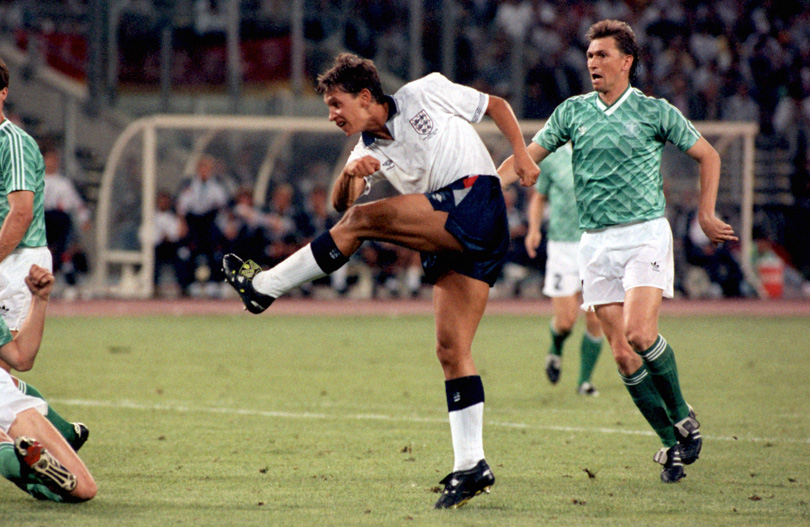
That night didn’t work out as planned, but the lyric dives back again to “Bobby belting the ball”: Bobby Charlton, (then) record goalscorer, honking in goals from all manner of distances, before a post-retirement standing as a knighted gentleman. Again, this keys directly into pride and hope: when your best player spies his chance from distance and the ball hurtles towards goal, and you involuntarily lurch forward, making an inchoate noise somewhere in the vicinity of “go on”.
Finally, ecstatically and emphatically, the memories settle on the three words usually sung more deafeningly than any others outside the chorus: “...and Nobby dancing.” It’s important, this: it can be seen as a mere joke to mention the toothless midfield destroyer’s cup-clenching jig on the Wembley turf, but Stiles fulfilled a crucial role doing the dirty work so that the collective could prosper. It’s not a stretch to say that Nobby’s dancing invokes the selfless heroism of the working classes, doing what they need to do to make things happen, and then taking full part in the celebrations when it’s done.
From pop to Platt
After the second chorus, Three Lions again shows its impeccable pop chops with a new different section. In music, the bridge – also called the middle eight, even though it’s not always eight bars and is often nearer the end than the middle, as here – should take the established musical palette in a slightly different direction, often while the lyrics either expand or encapsulate the song’s central message.
The Three Lions middle eight is largely instrumental, except for the samples of ‘commentary’. These are all positive, half of them historical – John Motson on David Platt’s late winner against Belgium at Italia 90, David Coleman on Gordon Banks’s save from Jairzinho in Guadalajara – and half fictional, written bespoke for the song as a riposte to the naysayers: “Good old England! England that couldn’t play football! England have got it in the bag!”
Meanwhile, the music is doing a mix of new things and old. Like the verses it largely uses four chords over a bar each, then repeats them. Also like the verses, it starts in F minor but then goes to D-flat major. This is a new chord for the song, a natural progression from F minor but somewhat racy and volatile considering the home key.
If that’s odd, it then changes from D-flat major to G minor, two chords with nothing in common, a combination almost unheard of in pop music. It’s a modulation precisely halfway around the musical scale, a leap known as the “devil’s interval” which was so controversial it was said to be banned by the church in the Middle Ages; recent historians have disputed this, but it is still a highly unusual musical trick.
As with the verses, it then resolves to C major, while feels comparatively wholesome and homely yet also optimistic: through the four chords, one note has steadily and optimistically climbed from C-natural to C-sharp to D-natural to D-sharp, like a rising eyebrow or a crowd getting to their feet.
The instrumentation augments this growing hope with a call-and-response of rising riffs between the safely familiar electric guitar and the spookily space-age sound of the theremin, forever associated with the Beach Boys’ Good Vibrations as well as old-school sci-fi films. Again, the music is taking us back, and so does the final, climactic lyrical phrase, which brings the entire song to a pause after crystallising the song’s message: “I know that was then, but it could be again...”.
There’s no assertion of destiny or divine right, just that conditional, finger-crossing “could”, the one that sends football fans hundreds of miles around the country every weekend, the idea that this might just be the day it all goes right. Without that hope, football – indeed, all sport, arguably all existence - is futile; to embrace that hope is to be human, with all its frailties.
Bringing it home
After a two-bar break, Three Lions reprises the musical intro – those McCartney keyboard stabs, that Beach Boys horn, and most of all that eternal hook: “It’s coming home…”. Just as on the intro, the beat kicks back in and the song bounces along, but Broudie has one final trick up his sleeve: while the refrain continues in the background, the chorus melody returns to soar above it. The two tunes combining in what’s technically known as polyphony, a technique humans have used across the globe for countless millennia. We’re now connecting not just with each other but with all our forebears.
Three Lions also pulls off a neat dichotomy in its melodic structure. The main melody or tune is pleasingly vertical – it goes hummably up and down rather than mumblingly along in a horizontal line – and yet overall it restricts itself to a narrow band of notes. In other words, it’s simultaneously memorable and singable.
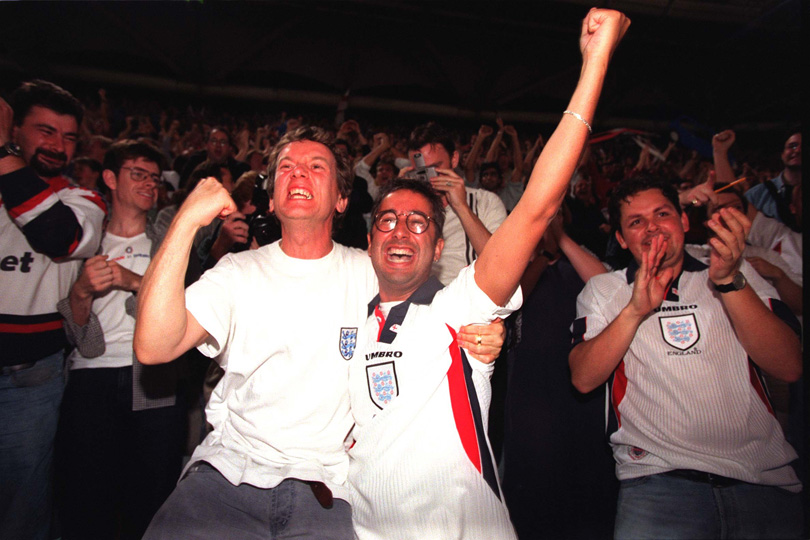
The melody is also well inside the tessitura or vocal range of most adult men. It never rises above middle C (the first note of Hey Jude) and never falls more than an octave below that: the lowest notes in the melody are the “-ing”s of the “it’s coming home, it’s coming home” refrain. And it doesn’t leap about much within that range, often following stepwise descents and ascents: think of “Three Lions on a shirt”, “that tackle by Moore and when Lineker scored”. It’s an easy song to sing, which means people do so, and it becomes a community singalong.
Apathy to anthem
Three Lions was recorded in spring 1996 and released in May, to widespread indifference. Although it wasn’t as hated as Simply Red’s official tournament song We’re In This Together, nor did it rocket into the consciousness. With much of the pre-tournament public hovering somewhere between apathy and antipathy towards England, it was dependent on events.
It was premiered at Wembley for the 3-0 friendly win over Hungary in mid-May, but it didn’t catch on. For their final preparations the squad flew to the far east, where photographic evidence of their boozy excesses exacerbated the disconnect between the team and the (media-fed) fans. It was played at the tournament opener between England and Switzerland, a disappointing 1-1 draw despite Shearer ending his goal drought, and didn’t do much then either.
But the Scotland game on Saturday June 15 changed history. Even after Shearer’s opener, Craig Brown’s team might have equalised from the spot – but the ball moved just before Gary McAllister struck it. David Seaman’s save protected a lead which was almost immediately doubled by Paul Gascoigne’s iconic flick, volley and tabloid-baiting celebration.
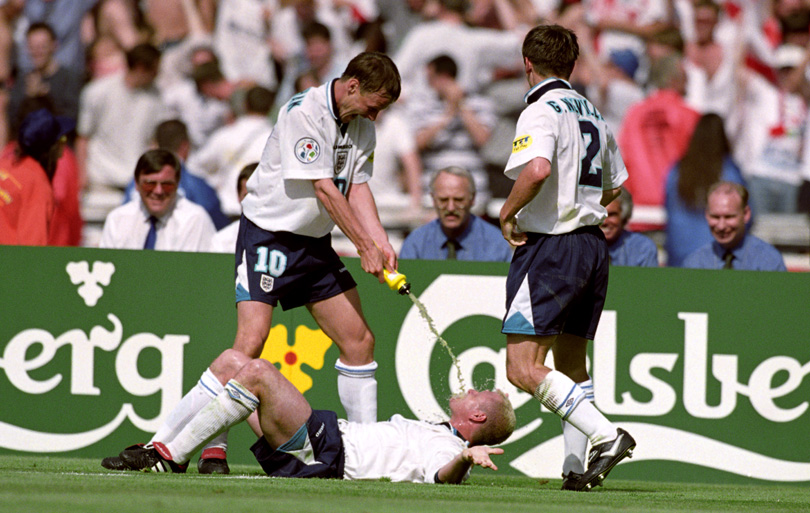
Three Lions was played over the Wembley sound system after the Scotland game and the joyous England fans started to pick up on it, noted by the television coverage. On the following Monday, DJs Chris Evans (Radio 1) and Chris Tarrant (Capital Radio) played it on their enormously popular breakfast shows, and it picked up pace.
That Tuesday night, England beat Holland 4-1 and some bright spark at Wembley decided to put the lyrics on the scoreboard for the exultant fans to sing along. They have been doing so ever since.
At the time, David Baddiel was not an easy man to shock or impress. After all, he had an enormously popular TV show with Skinner and previously, with comedy partner Rob Newman, he had played to a sold-out crowd of 12,500 at Wembley Arena on a tour so big the NME rechristened comedy “the new rock ‘n’ roll”. But he later described hearing the Wembley crowd singing Three Lions as “one of the most extraordinary moments of my life”, admitting he still breaks out in goosebumps whenever he thinks of it.
Although also invested in it personally, Baddiel reacts to Three Lions like so many do, because it is a cultural touchstone. It’s inclusive, not aggressive. It’s not about war and fighting, it’s about dreaming. It’s frequently sung by drunkards in public but usually in an attempt to provoke a mass singalong rather than to prove their individuality or masculinity. Try singing it angrily; it just doesn’t work. Anyone who tries is utterly missing the point.
As Broudie puts it: “It’s a very emotional record that sidesteps all that horrible stuff, and goes right to the heart of when you’re just a kid supporting a football team. At the most raw, emotional times, people sing together, whether it's a funeral or football match. Three Lions has something of that – we're all in this together, we're all willing to dream.”
Three Lions does that through a brilliant crystallisation of a certain sort of Englishness. It’s about the near-parodical national trait of waiting patiently and queueing diligently while hoping fervently. It’s about the possibility of greatness, but also of a unifying happiness and celebration. It’s about empathy and community and love and hope and dreams. That’s what makes us human, and that’s what makes Three Lions so popular and perfect.
New features you'd love on FourFourTwo.com
Gary Parkinson is a freelance writer, editor, trainer, muso, singer, actor and coach. He spent 14 years at FourFourTwo as the Global Digital Editor and continues to regularly contribute to the magazine and website, including major features on Euro 96, Subbuteo, Robert Maxwell and the inside story of Liverpool's 1990 title win. He is also a Bolton Wanderers fan.
 Join The Club
Join The Club





